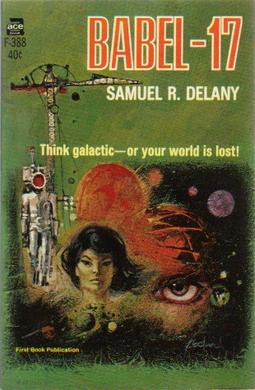Babel-17

First edition
|
|
| Author | Samuel R. Delany |
|---|---|
| Country | United States |
| Language | English |
| Genre | Science fiction novel |
| Publisher | Ace Books |
|
Publication date
|
1966 |
| Media type | Print (Hardcover & Paperback) |
| Pages | 173 pp |
Babel-17 is a 1966 science fiction novel by American writer Samuel R. Delany in which the Sapir–Whorf Hypothesis (that language influences thought and perception) plays an important part. It was joint winner of the Nebula Award for Best Novel in 1966 (with Flowers for Algernon)[1] and was also nominated for the Hugo Award for Best Novel in 1967.[2]
Delany hoped to have Babel-17 originally published as a single volume with the novella Empire Star, but this did not happen until the 2001 reprint.
Plot summary
During an interstellar war one side develops a language, Babel-17, that can be used as a weapon. Learning it turns one into an unwilling traitor as it alters perception and thought. The change is made more dangerous by the language's seductive enhancement of other abilities. This is discovered by the beautiful starship captain, linguist, poet, and telepath Rydra Wong. She is recruited by her government to discover how the enemy are infiltrating and sabotaging strategic sites. Initially Babel-17 is thought to be a code used by enemy agents. Rydra Wong realizes it is a language, and finds herself becoming a traitor as she learns it. She is rescued by her dedicated crew, figures out the danger, and neutralizes its effects.
The novel deals with several issues related to the peculiarities of language, how conditions of life shape the formation of words and meaning, and how the words themselves can shape the actions of people.
Language
The language portrayed at the center of Babel-17 contains interesting linguistic features including the absence of a pronoun or any other construction for "I". The heroine finds her perceptions (and even her physical abilities) altered once she has learned Babel-17. In this Delany's novel influenced a generation of writers: Native Tongue by Suzette Haden Elgin[citation needed], The Dispossessed by Ursula K. Le Guin[citation needed], Embassytown by China Miéville, "In Luna Bore Coda" by Joshua Nilles, and, more evidently, the short story "Story of Your Life" by Ted Chiang[citation needed]. It also resembles a few preceding science fiction novels which deal with how languages shape the political and cultural stratum of societies, such as The Languages of Pao by Jack Vance or Anthem by Ayn Rand, and language as a weapon was adapted as a plot device in Neal Stephenson's Snow Crash.
Other media
In 2014, the work Babel-17 was told in tandem with a partial biography of Samuel R. Delany's early years in the form of the play 'The Motion of Light In Water', based on a 1988 autobiography with the same title, produced by Elbow Room, an Australian theatre company directed by Marcel Dorney.
References
- notes
- Bibliography
- Lua error in package.lua at line 80: module 'strict' not found.
- Lua error in package.lua at line 80: module 'strict' not found.
- Lua error in package.lua at line 80: module 'strict' not found.
- Lua error in package.lua at line 80: module 'strict' not found.
- Lua error in package.lua at line 80: module 'strict' not found.
- Lua error in package.lua at line 80: module 'strict' not found.
External links
- Errata for Babel-17, approved by the author.
- 2009 retrospective review by Jo Walton: "Babel 17 was published in 1966, the year in which I learned to talk."
- Babel-17 at Worlds Without End
- Elbow Room Theatre